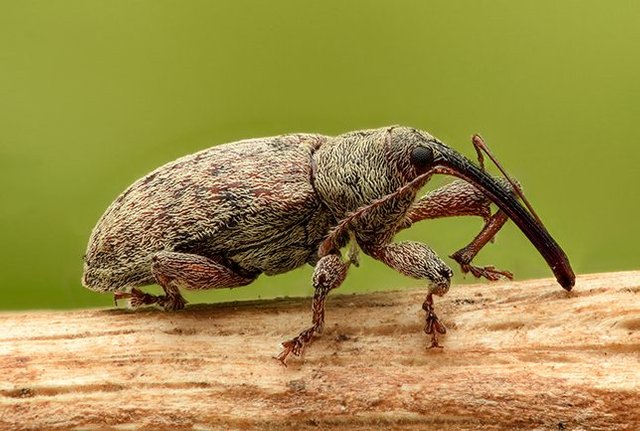VEGETABLE WEEVIL(life cycle, habitat and control)
Proliferation and Life Cycle

Source
The vegetable weevil will have one age for every year, with the grown-ups at times living more than 2 years. This bug enters torpidity amid the mid year months in plant deposit or waste along the field's edge. At the point when the grown-ups rise up out of the ground amongst January and June in the wake of overwintering, they will eat the plants accessible to them, somewhere in the range of 3 to 30 days. It is fascinating to take note of that there are no guys, just females; in this manner, they needn't bother with their eggs to be prepared so as to replicate. Females can lay several eggs all through the fall season and into spring. They put their eggs in the dirts surface, which is the place they will bring forth into hatchlings after around 14 days. The hatchlings just feed around evening time on youthful plants; they will remain in the ground while the sun is out. They remain hatchlings for 23 to 45 days, which is the point at which they will pupate. The pupation phase of improvement will last 2 to 14 days, contingent upon the atmosphere. Their whole advancement from egg to grown-up can take up to 4 months or as short as multi month.
Vegetable Weevil Identification and Habitat
Recognizable proof
Vegetable weevil grown-ups are around 8mm long nose creepy crawlies, are dim to darker in shading and have a delicately hued detect that is in the state of a V on its wing covers. These wings; be that as it may, are not fit for flight. Their eggs are oval, cream white, and around 0.5mm wide. They will swing to a dark when they grow further. The hatchlings can develop to be around 12mm long, are a yellow to green shading and have an orange to dark colored head. They have no legs and their body is bended. The pupa is a light yellow, swinging to a dark colored as it develops. It is formed intently to the body of a grown-up, being near 8mm long.
Natural surroundings
This bug can be found in many regions all through the world, as long as the atmosphere is subtropical or has warm temperatures. Both the grown-ups and hatchlings are pulled in to various diverse vegetable yields, for example, carrot, potato, turnip, lettuce, and tomato. They additionally feed on tobacco and a few weed writes. In particular, they eat the buds, roots and foliage of the plants. This nuisance can bigly affect a products yield when they eat the seedlings, as this can stunt the plants development and defoliation can happen which can execute the plant. This is the reason invasion right off the bat in the developing season when plants are youthful is the most harming. When they eat folliage, they will abandon unevenly formed openings. Because of the way that the grown-ups can't fly, it can take a while for new territories to wind up swarmed, regularly bringing about spotty harm inside the field.
Vegetable Weevil Management and Control Methods
Social Control
On the off chance that the pervasion is restricted to 1 line or zone, it might be encouraged to crush that zone, or to go out when they are most dynamic (amid the night), and pick the weevils off of the plants. You can likewise utilize sticky hindrances to prevent the creepy crawlies from flying out to new regions if the issue is in your garden. For deterrent measures, substitute host plants for non-have plants whenever you choose to plant around there. Plant turn can hold their populace within proper limits. Likewise, keep your patio nurseries and fields without weed and develop in the fall and winter. It is imperative to take note of that having agreeable control is reliant on utilizing an incorporated administration framework that incorporates the utilization of social and compound techniques.
Chemical Control
Bug sprays blended with azadirachtin or pyrethrin can frequently give adequate control. Now and again spot medications are required. The monetary limit to start treatment is when no less than 5 percent of youthful plants have been murdered or injured. While treating tobacco plants, utilize bug sprays, for example, acephate, lambda-cyhalothrin, or lambda-cyhalothrin in addition to chloratraniliprole. Furthermore, foliar bug sprays that are put on your vegetable yields will likewise control the vegetable weevil. Make sure to precisely read the name for alerts and legitimate application.
Thamks for sharing this post.... we @farms
Resteem
(to be a part of this community; ensure to always use #farms and #steemchurch for agricultural related post)
SteemChurch Farm ( @FARMS)
Hello! I find your post valuable for the wafrica community! Thanks for the great post! @wafrica is now following you! ALWAYs follow @wafrica and use the wafrica tag!